#american theatre magazine
Text
Another historically ambitious multi-part Shakespeare project is taking shape at the Guthrie Theater. The storied Minneapolis institution is currently performing the Bard’s epic trilogy, Richard II, Henry IV (its parts 1 and 2 have been condensed into a single evening), and Henry V, in rotating repertory. A company of 25 actors is bringing the story to life, swapping characters and costumes depending on the show and night.
In development for years, the project’s scope first turned heads when it was announced pre-pandemic in 2020. But considering the challenges that theaters now face in 2024, the endeavor has reached a new level of dramatic novelty.
“In this moment, with some retraction in the field—and the Guthrie is not outside of those challenges—I felt it was important that we as an organization plant a flag here,” said Guthrie artistic director Joseph Haj, who is helming the plays. “We wanted to show that we’re still very much capable of work of scale, of ambition and of intelligence.”
#shakespeare#william shakespeare#theater#theatre#history plays#guthrie#guthrie theater#american theatre magazine#richard ii#henry iv#henry v
7 notes
·
View notes
Text
‘A Strange Loop’ Takes a Victory Lap That Was Years in the Making
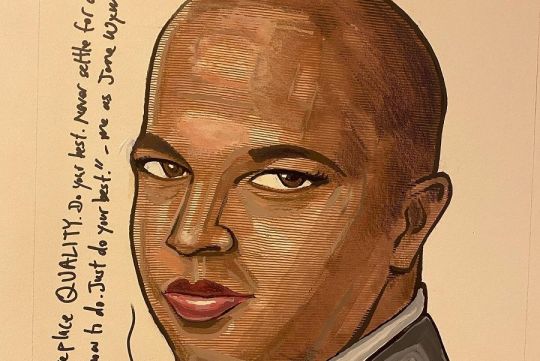
When he put ‘Broadway’ in a song lyric, Michael R. Jackson was unwittingly naming the destination, and the destiny, for his unapologetically Black and queer musical, which won the Best Musical Tony last night.
BY MARCUS SCOTT
On a cloudy Wednesday morning, less than a week before he was to make his overdue, pandemic-postponed Broadway debut, musical theatre writer Michael R. Jackson was scrambling. His idiosyncratic, existential, metafictional musical A Strange Loop was days away from opening, after the creative team had been forced to cancel a first preview performance when COVID-19 cases were discovered within the company. That meant less time for Jackson to finesse scenes and songs, causing a burst of small panic behind the scenes. Originally scheduled to start previews on April 6, the production launched instead on April 12, just in time for the show’s understudies to spring into action and for Jackson to make revisions. It opened just two weeks later, on April 26, becoming a bona fide critical smash, with Jackson being celebrated for the musical’s craftsmanship, fearlessness, and unbridled humanity. Sales have been strong, and last night’s Tony wins—for Jackson as the show’s book writer, and A Strange Loop as best musical—are sure to bolster the show’s fortunes.
That Wednesday before opening, Jackson was thinking back to the beginning of rehearsals.
“It was a really exciting and emotional day,” Jackson, 41, recalled from the Washington Heights apartment he’s lived in for 15 years. “I told the room that day that it was really amazing that this thing I wrote alone in a room up the stairs of this little old lady in a bungalow house in the middle of nowhere in Jamaica, Queens—that I wrote this monologue as a little life raft for myself on my little Compaq Presario laptop—somehow, over the years, blossomed into this mighty ship that landed on Broadway.”
The seeds for that ending were planted, he thinks, when he added the lyric to the opening number calling what we were about see a “Big, Black, and queer-ass American Broadway show.” He confessed, “Even when I wrote that, I didn’t think the show was going to Broadway, and that wasn’t even what I was trying to do. I was trying to make what felt like a Broadway show to me—my version of what that was supposed to be. So it’s just wild, all that manifesting and that sort of artistic rigor ended up resulting in the show going to Broadway. It feels like a miracle or magical, or something otherworldly, that that could happen.”
A Strange Loop follows Usher (played Jaquel Spivey in his first professional gig out of college), a 25-going-on-26-year-old “overweight-to-obese” Black queer musical theatre writer making a musical about a 25-going-on-26-year-old “overweight-to-obese” Black queer musical theatre writer, ad infinitum. The character’s name is both a reference to the blockbuster-selling R&B singer-songwriter and to the day job the character holds at The Lion King on Broadway, counting down intermissions while assisting entitled wealthy patrons to their seats and dreaming up his breakthrough show; we spend the majority of the show in his mind. Accompanying Usher is a Greek chorus of six “Thoughts,” played to perfection by the spectacular sextet of L Morgan Lee, James Jackson Jr., John-Michael Lyles, John-Andrew Morrison, Jason Veasey, and Antwayn Hopper, each of them contrasting, conspiring against, or calling him out at every turn.
The origins of Jackson’s crowning achievement have become somewhat mythic: Shortly after graduating from New York University’s Dramatic Writing Program in 2002, a 21-year-old Jackson wrote a thinly veiled monologue, a coping mechanism for his career anxiety as a fresh-out-of-college playwright called “Why I Can’t Get Work,” that became the kernel for the show. That monologue was about a young Black gay man walking around New York assessing his life, his career trajectory, and his worth as a Black gay man who is “too fat,” “too femme,” and “too Black” for the culture.
Two years later, while Jackson was attending NYU’s Graduate Musical Theatre Writing Program, a peer of his, Darius Marcel Smith, performed an original song about a one-night stand with another man, and the guilt and shame that came along with being a God-fearing Christian. Inspired, Jackson jotted a lyric in his notebook: “All those Black gay boys I knew who chose to go on back to the Lord.” This phrase, and a musical motif from Tori Amos’s “Pretty Good Year” (the third single from her sophomore effort Under the Pink) inspires him to pen “Memory Song,” snapshots from his coming of age in Detroit as a gay boy with a religious and homophobic upbringing; it would be the first song he’d write as composer and lyricist, and the first germ of what would one day be A Strange Loop. The monologue soon grew into a solo show titled Fast Food Town, performed to mixed reviews Off-Broadway at Ars Nova.
Originally titled “Gayville”—a riff on Exile in Guyville, Liz Phair’s seminal 1993 bedroom-pop indie-rock debut, itself a response to the 1972 Rolling Stones’ cock-rock album Exile on Main Street—Jackson’s musical followed an ultra-self-aware, disillusioned, and furious 20-something undergoing a quarter-life crisis and the downward spirals that come with wading through a liminal space of being a postgraduate, pre-career artist trying to find their corner of the sky. While Phair’s influence looms over the project (check out “Inner White Girl”), her inclusion was a bit more deliberate at first.
“There was an old, old, old draft of A Strange Loop wherein Usher, the character in the musical, was writing these mashups of his songs to Liz Phair songs, mostly to her Exile in Guyville album, and there was a narrative also within the piece where he was trying to reach out to her and get her permission to use her music in the show but also talking to her through his own music mashed up with hers,” Jackson explained. “In real life, I was trying to track her down and get the rights to use her music as well.”
Eventually Phair got back to Jackson, encouraging him to write his own material and make it personal. So he scrapped the mash-ups and began to purge, but thankfully he didn’t take himself too seriously. As a result, A Strange Loop is a disruption, an existential treatise on the soul as it wrestles with topics and taboos at the crossroads of the sacred and profane, all while eviscerating the musical theatre form. Yet its most alluring takeaways come from Jackson’s obsession with the self and with self-identity—an impulse that no doubt be traced to the singer-songwriters he adored growing up.
“There was a song I had written in the show that’s no longer in it called ‘Fan Boy’ that was a mashup against the Liz Phair song called ‘Strange Loop,’ and for years I never knew what the term ‘strange loop’ was—it was just a song on the album that I just really liked,” he clarified. One day it dawned on Jackson to type the phrase into Google, which led him to Douglas R. Hofstadter, the scholar of cognitive science and comparative literature. In his Pulitzer-winning 1979 book Gödel, Escher, Bach: An Eternal Golden Braid, Hofstadter coined the term “a strange loop” to describe the navel-gazing nature of individualism and intelligence, writing: “In the end, we are self-perceiving, self-inventing, locked-in mirages that are little miracles of self-reference.” The term, used to describe the paradox of one’s sense of self, is also mirrored in Jackson’s allusions to what W. E. B. DuBois called the “double-consciousness” of African American selfhood created by racism and anti-Blackness. Thus began a series of strange loops, with Liz Phair leading Jackson to Hofstadter, which in turn led him to the title and structure of his groundbreaking hit.
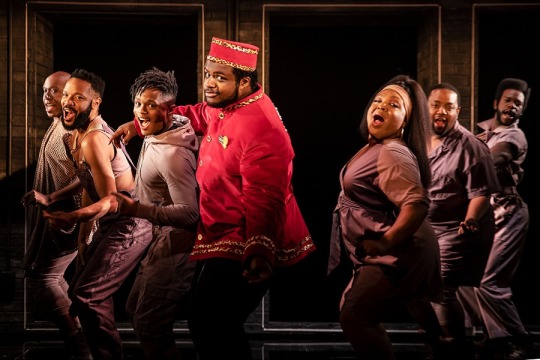
A Strange Loop is hardly the first metafictional musical. There was Jonathan Larson’s semi-autobiographical rock monologue-turned-musical, tick, tick . . . BOOM!, adapted by Lin-Manuel Miranda into a feature film last year. There’s also Jeff Bowen and Hunter Bell’s [title of show], a one-act musical about four characters creating the musical they’re simultaneously performing, which played at the Lyceum Theatre 14 years prior. Yet Jackson’s acclaimed pop-rock Bildungsroman actually follows a lineage of sui generis metafictional musical theatre writers of the post-Black Arts Movement tradition. Like Kirsten Childs’s The Bubbly Black Girl Sheds Her Chameleon Skin and Stew’s Passing Strange before it, A Strange Loop is a funny, life-affirming coming-of-age story about a young, gifted, and Black creative as they journey toward self-discovery and self-acceptance. Fusing gospel, jazz, punk, and blues with rock music, Passing Strange is a fourth wall-breaking picaresque odyssey of Black identity and code-switching against a backdrop of Berlin’s 1987 May Day riots. Through a mélange of ‘60s girl group pop, R&B, and showtunes, The Bubbly Black Girl Sheds Her Chameleon Skin explores a young woman’s battle with internalized racism and self-worth while surrounded by racial profiling, de facto segregation, and sexism in the wake of 16th Street Baptist Church bombing.
A Strange Loop continues the conversations that began with those genre-defying musicals, merging gospel, folk rock, bedroom pop, and alternative music while forging a new path for Black and queer storytelling in the age of Truvada. In American theatre, white gay men have co-opted and oversaturated the marketplace for LGBTQ narratives. Whether it’s the gay Civil Rights movement (Mart Crowley’s The Boys In The Band, Dustin Lance Black’s 8), or the HIV/AIDS epidemic (Larry Kramer’s The Normal Heart, Tony Kushner’s Angels in America: A Gay Fantasia on National Themes, Steven Dietz’s Lonely Planet, William Finn’s Falsettos), or collective trauma (Doug Wright’s I Am My Own Wife, Moisés Kaufman’s The Laramie Project, Martin Sherman’s Bent, Harvey Fierstein’s Torch Song Trilogy, and Douglas Carter Beane’s The Nance), or even queer joy (Fierstein’s La Cage aux Folles, Sherman’s The Boy From Oz). Naturally, a show centering a plus-sized, dark-skinned Black queer man with ambition stands in opposition by design. But A Strange Loop goes further than that, showing no qualms about interrogating such issues as the HIV stigmatization of the Black queer community, racial fetishization, internalized homophobia, parental blackmail, self-loathing, and the paradox, trauma, joy and vicissitudes of being Black and queer and religious.
Indeed, in its brisk 90 minutes, A Strangle Loop both deconstructs and glorifies Black art and queer iconography with absolute abandon. Bristling with references to The Golden Girls and Designing Women, advice columnist Dan Savage, and spoken word artist Audre Lorde, Stephen Sondheim and bell hooks, Scott Rudin and Betty Friedan, the show skews the lines between gay and straight, Black and white, high and low culture with aplomb, putting the musical-within-a-musical in a league of its own, while bridging divides very few of the aforementioned shows have.
No one is safe from critique. One of the biggest targets of Jackson’s ire is Tyler Perry, the multimillionaire movie media mogul, well known for his lowbrow, Chitlin’ Circuit-inspired entertainment, full of ham-fisted messages about the power of prayer. Hallmarks of Perry’s works are satirized and spoofed with surgical precision in A Strange Loop: The stalwart matriarch, the low-income black sheep with an addiction to crack cocaine, the “Strong Black Woman” meandering through life as a lonely spinster with an offstage Ken doll lover interest. Jackson’s contentious relationship with Perry began when a childhood friend introduced him to the impresario’s work shortly after he arrived in New York in 1999; as a gag gift for her birthday, he purchased tickets to see a staged production of Why Did I Get Married? at the Beacon Theatre, starring R&B vocalist Kelly Price, who wore a fat suit in the first act. In A Strange Loop, Usher calls Perry out for his “simple-minded hack buffoonery,” but the mockery is tinged with anxiety; we get the sense that Usher might genuinely be afraid he will create such color-by-number material himself. With each gibe, Jackson holds up a mirror to both the protagonist and himself with profound hilarity and heartbreak.
In one of the show’s most subversive, farcical numbers, “Tyler Perry Writes Real Life,” Usher is confronted by his Thoughts as they masquerade as historical Black figures: Zora Neale Hurston, James Baldwin, Marcus Garvey, Harriet Tubman, and a proxy for every Oscar-bait antebellum picture simply given the name Twelve Years a Slave. Throughout the tune, the Thoughts chastise him for imagining that he is above Perry’s work, especially when an agent offers him an opportunity to quickly ghostwrite a gospel play—news that overjoys his devout parents but repulses Usher. While Usher’s critiques about Perry’s oeuvre have been echoed by his peers, it is his pointed criticism of the filmmaker’s stigmatization of Black queer sexuality and HIV that come into sharpest focus, especially where Perry’s “hate the sin, not the sinner” ethos is concerned. Toward the end of the show, Usher leads his Thoughts in a revival number titled “AIDS Is God’s Punishment,” ridiculing Perry’s proclivity to perpetuate stigma and condone the belief that people living with HIV are sinners who deserve punishment for loving and living out loud. It is a primal scream, Usher’s direct confrontation with the fear mongering and homophobic scripture preached down to him as a youth, as well as a moment of grief for a friend he lost to AIDS. Jackson doesn’t just critique Perry and the Black church here; he also zeroes in on the American theatre and its role in disregarding Black queer people and their stories in favor of white comfort.
“Being willing to challenge any assumptions or popular points of view, being able to question any orthodoxy or status quo—to me that goes in all directions,” Jackson said. “That means if Black Twitter is into something and I’m not into it, that means being willing to risk the ire of Black Twitter, that means being willing to risk the ire of the theatre world, that means being willing to risk the ire of liberal Democrats, of conservatives, of whomever—white people, Black people, everyone, treating everybody the same—and being willing to stand alone, if necessary, in your truth.”
A lot has changed for this musical theatre provocateur in recent years. A major career shift came when A Strange Loop was awarded the Pulitzer Prize for Drama in 2020, becoming only the 10th musical to earn the honor overall and the first to win the award without a Broadway run. Jackson, who was watching an episode of Bravo’s The Real Housewives of Atlanta while conversing with playwright Branden Jacobs-Jenkins when he received the news, not only made history as the first Black artist to win for writing a musical; he has also become part of a string of Black-authored Pulitzer winner, with Jackie Sibblies Drury’s divisive critical race experiment Fairview nabbing the award in 2019, and Katori Hall’s The Hot Wing King taking the award in 2021 and James Ijames’s Fat Ham winning it this year.
That win was part of the momentum building behind A Strange Loop, which had its Off-Broadway premiere at Playwrights Horizons in 2019, then a limited engagement at Washington, D.C.’s Woolly Mammoth Theatre Company last year. Joining a team led by producer Barbara Whitman and Page 73 Productions, the show’s current Broadway outing has attached an impressive Rolodex of stars to its co-producers’ roster, including RuPaul Charles, Don Cheadle, Jennifer Hudson, Mindy Kaling, Billy Porter, Ilana Glazer, Alan Cumming, Zach Stafford, Cody Renard Richard, Benj Pasek, and Justin Paul. It garnered a record 11 Tony nominations, and though it only took home two of those, they were ones that count: Best Book of Musical and Best Musical. (Best Original Score went to Six.) These wins cap a busy awards season that saw it take home Outstanding Production of a Musical at the 2022 Drama League Awards, and an Outstanding Actor in Musical Award for lead actor Jacques Spivey, who also got an Outer Critics Circle Award and a Theatre World Award honor. Meanwhile L Morgan Lee’s performance earned her the distinction of being the first openly transgender performer to originate a role in a Pulitzer-winning piece of theatre and the first to receive a Tony nomination. Jackson was also included in Time Magazine’s Time 100, an annual listicle of the most influential people in the world, where he was nominated by Porter.
Like many writers for the theatre, he has also become an in-demand writer for TV and film. He recently joined the creative team of the Amazon original series I’m a Virgo, a half-hour superhero satire from writer-director-producer Boots Riley (Sorry to Bother You), starring Jharrel Jerome. Jackson is also developing a TV series for ABC Signature and sold an original pitch to write an untitled horror feature for A24, which Ari Aster and Lars Knudsen are producing under their Square Peg banner. But not to worry, theatre fans, Jackson is still at work on various stage works: White Girl in Danger is a new pop-rock musical partly inspired by classic daytime soaps and ’90s-era Lifetime movies, in development with the Vineyard Theatre Off-Broadway and director Lileana Blain-Cruz; and Teeth, based on the 2007 indie vagina dentata horror comedy by Mitchell Lichtenstein, is being workshopped in collaboration with composer-lyricist Anna K. Jacobs. Jackson has also been commissioned by LCT3, Lincoln Center Theater’s program for emerging artists, to pen Accounts Payable, an original musical inspired by the days when he was slumming it as a finance clerk and executive assistant.
From those bleak early to his current success, Jackson’s North Star has been his dedication to his craft and to the truth.
“I do feel like I’ve changed in a lot of ways,” Jackson said of the past few years in the spotlight. “But I also feel like I am the same person I’ve always been, which is to say I’ve always been somebody who has been trying to get at the truth of life as I understand it and constantly try to scavenge and dig deeper and get past the surface level answers of questions I might be having or that confuse me. I feel like as a young person, a young writer, I was doing that from a much younger perspective.
“That has been the trail I tried to blaze: to be willing to have an unpopular opinion and have a nuanced opinion,” he continued. “That’s only gotten more important to me, especially over these last couple of years, as lots of cultural conversations have taken hold and really gotten louder. I have lot of criticisms and questions in places where I stand apart from my peers, and I have to be willing to stand in that place. I try to stand in that place respectfully and with compassion, even when I want to read people for fucking filth. Even when I have utter contempt for some people and ideas that I see being bandied around.”
As uncompromising as his show’s protagonist, Jackson stood in his truth, and, upon receiving his Tony Award for Best Book of a Musical to a standing ovation, encouraged the American theatre to opt for quality in art. This is a fulcrum moment not just for Jackson, but for every outcast and outlier building their life rafts on the island of misfit toys that is the theatre at its best. As a patron sings to Usher in “A Sympathetic Ear”: “If you’re not scared to write the truth, then it’s probably not worth writing / And if you’re not scared of living the truth, then it’s probably not worth living.”
Marcus Scott is a New York-based playwright, musical writer and journalist. He’s written for Architectural Digest, Time Out New York, The Brooklyn Rail, Elle, Essence, Out and Playbill, among other publications.
#Michael R Jackson#A Strange Loop#MichaelRJackson#AStrangeLoop#Marcus Scott#MarcusScott#WriteMarcus#Write Marcus#American Theatre Magazine#Black playwrights#Black Musical Theatre Writers#Black Musical Theater Writers
4 notes
·
View notes
Photo


a RAISIN in the SUN, «Playbill», April 2014 [Collection of the Smithsonian National Museum of African American History and Culture, Smithsonian Institution, Washington, D.C.]
#graphic design#typography#theatre#theater#play#magazine#cover#magazine cover#lorraine hansberry#james baldwin#playbill#national museum of african american history and culture#smithsonian institution#2010s
47 notes
·
View notes
Text
Friends, I have failed you all. I've seen a lot of posts over the last week with a lot of great biographical detail about many of the flyers and aircrew who've been name-dropped so far in Masters of the Air - and I haven't seen a single thing about the one name that is directly in the center of this blog's lane.
In Part 2, returning from their mission to Trondheim, Cleven and Egan walk into the Interrogation hut and Egan accepts a cup of coffee from a woman he thanks as Tatty. Later on, at the dance, James Douglass remarks that he will be 'coming in hot' on one of the American Red Cross women on the other side of the room, and one of his friends asks "General Spaatz's daughter? Or the other one?"
Katherine "Tatty" Spaatz was a member of the American Red Cross Clubmobile service and the daughter of General Carl "Tooey" Spaatz, who commanded the Eighth Air Force on its move to England. (General Spaatz later moved to overall command of the entire Army Air Forces in the Europe Theatre of Operations, or ETO. He is, as the kids say, rather important.)
But we're not talking about him here. We're talking about her.
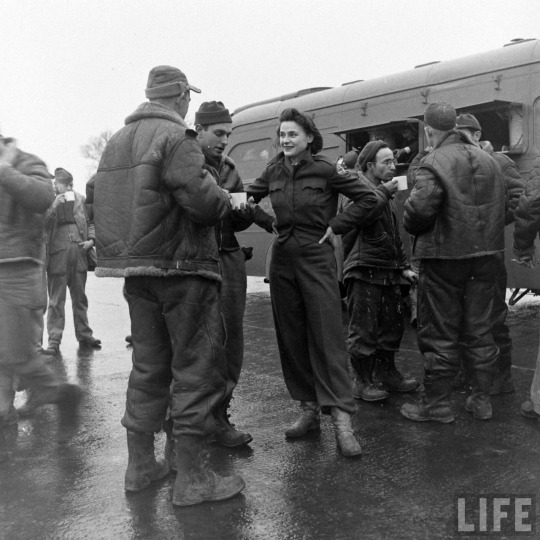
Katherine was 22 years old when she arrived in Europe with the Red Cross. (One of her traveling companions that trip was Kathleen Kennedy, daughter of former U.S. Ambassador Joseph P Kennedy Sr., also coming to serve overseas with the ARC.)
The American Red Cross's mission in Europe had many facets during the Second World War - in addition to activities we might think of today, like collecting blood, providing disaster relief at home and running first aid seminars, they were responsible for collecting and distributing packages for Prisoners of War.
They also operated large canteens like the Rainbow Corner club, a recreational facility in London where soldiers on leave could get a room for the weekend, a bite to eat, and a number of other amenities. Smaller clubs called Donut Dugouts provided a space where a serviceman could always be assured of a cup of hot coffee, a donut, and a pretty girl to talk to, specially recruited for being friendly, fair, approachable, and specially trained to be the girl next door overseas. In addition to these more permanent installations, they also operated the Clubmobile service, a mobile version of their popular Dugouts that moved operations into retooled Green Line Bus Company buses to take donuts and a taste of home to the front line.
Tatty, as she was called, worked on the Clubmobile "North Dakota" along with Julia "Dooley" Townsend, Virginia "Ginny" Sherwood, and Dorothy "Mike" Myrick. Life Magazine did a full article on their clubmobile in February of 1943, which you can read online at the link. There is another lovely blog post with pictures here. She also worked for a time in a more permanent post at the USAAF base at Snetterton Heath, and was later sent to France. You can read a little bit more about her and see more pictures at her bio page at the American Air Museum in Britain website.
If you'd like more information about Tatty, Helen, and women like them, as well as the Clubmobile service, consider reading the following:
Slinging Doughnuts for the Boys by James H. Madison
Battlestars & Doughnuts: World War II Clubmobile Experiences of Mary Metcalfe Rexford
War through the Hole of a Donut, by Angela Petesch
Goodnight, Irene (fiction) - Although this is a novel, it is based on Luis Alberto Urrea's mother's time as a Clubmobile worker and her personal papers.
#women in world war two#women in wartime#original girl gang#american red cross clubmobile service#katherine tatty spaatz#masters of the air#i cannot believe it took me a WHOLE DAMN WEEK
228 notes
·
View notes
Text


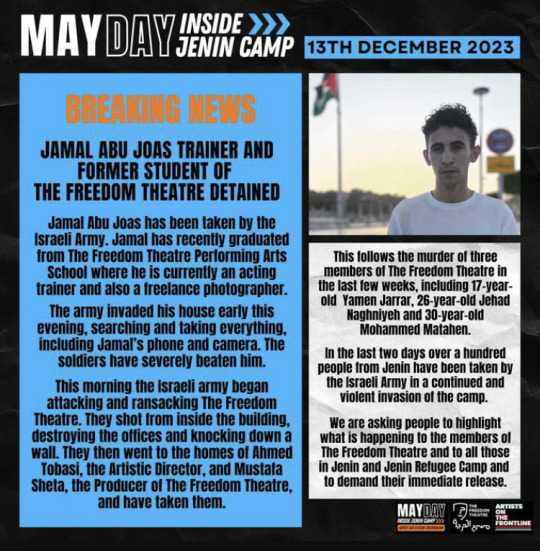
The producer, artistic director, and an educator at The Freedom Theatre in Jenin were kidnapped alongside over 100 other Palestinians today (13 Dec 23).
The Freedom Theatre is a hub of cultural resistance and artistic community in the occupied West Bank.
Join me in calling on theatre institutions to demand the immediate release of these kidnapped artists. Here's the email I'm sending; feel free to copy but please adjust the phrasing to avoid spam filters:
"Today in Jenin refugee camp, The Freedom Theatre's artistic director Ahmed Tobasi, producer Mustafa Sheta, and acting teacher Jamal Abu Joas were taken hostage by the Israeli army alongside over one hundred other Palestinian civilians. This follows the murder of three Freedom Theatre artists in the last few weeks: Yamen Jarrar (17), Jehad Naghniyeh (26), and Mohammed Matahen (30). The global theatre community must stand up in support of artists persecuted by the occupation regime. There is extensive documentation of torture in Israeli occupation detention centers. I urge [name of organization] to issue a public statement demanding the immediate release of these hostages.
Here's a recent article about The Freedom Theatre's work with traumatized children: [AJ link above]"
I'm also adding a brief statement from my perspective as a theatre artist, expressing my disappointment in my local and national theatre scene for its silence. If you're a theatre artist or theatre-goer I encourage you to do the same!
The international and US institutions I'm emailing:
International Society for the Performing Arts - [email protected], [email protected], [email protected], [email protected]
International Theatre Institute - [email protected], [email protected]
International Amateur Theatre Association - [email protected]
Theatre Without Borders - [email protected]
ASSITEJ - [email protected], [email protected], [email protected]
International Federation for Theatre Research - [email protected]
IDEA- [email protected]
International Schools Theatre Association - [email protected], [email protected], [email protected], [email protected]
Theatre for Young Audiences USA - [email protected], [email protected], [email protected]
American Association of Community Theatre - [email protected], [email protected], [email protected]
American Theatre Wing - [email protected], [email protected]
American Theatre Magazine - [email protected], [email protected], [email protected], [email protected]
American Alliance for Theatre and Education - [email protected]
American Society for Theatre Research - [email protected], [email protected]
Theater of War - [email protected], [email protected]
Actors' Equity - [email protected], [email protected], [email protected], [email protected]
The Broadway League - [email protected]
PEN America - [email protected], [email protected]
Please also email organizations where you live, and any personal contacts in the performing arts. You can also tag organizations in the comments of The Freedom Theatre's posts on ig @.thefreedomtheatre
315 notes
·
View notes
Text
Happy 20th anniversary FMA. Let's put some forgotten feathers back in your cap.
Melissa was the #1 anime theme song to wrap 2003, and peaked at #2 on the Oricon Singles Chart - Japan's music industry standard for charting CD singles. Melissa became the #34th top selling single for 2003 and was only on sale for two months of the year (Melissa went on sale Sept 26th and Oricon is tracked Dec 1 - Nov 30). Melissa ranked #66 in top Japanese singles for 2004 too. The song would be on the Oricon charts for 38 weeks! Melissa won Animage Magazine's 2004 Anime Grand Prix for Best Anime Song.
Ready Steady Go! was the 18th best selling single of 2004 and peaked at #1 on the Oricon Singles Chart, and would do so charting less than half the time of Melissa, 16 weeks.
FMA sweeps Animage Magazine's 26th Annual Anime Grand Prix held in June 2004 - winning best series, best male character (Ed), best female character (Riza), best voice performance (Romi Park), best song (Melissa @ #1, Kesenai Tsumi @ #2), and best episode (7).
FMA is on the cover of all 3 major Japanese animation magazines for July 2004 - Newtype, Animage, and Animedia.
July 31, 2004 L'arc~en~Ciel make their North American debut at Otakon. Prior to their concert held at the 1st Mariner Place (now CFG Bank Arena) in Baltimore, to a crowd of 12,000 the first episode of the upcoming FMA English dub is premiered.
Rewrite peaks at #4 on the Oricon charts and becomes the 63rd best selling single of 2004. Rewrite won Best Anime Theme Song at the American Anime Awards at New York City Comicon in 2007.
FMA gets the rare honour of going to reruns in Japan.
FMA debuts on Adult Swim and is on the cover of all 3 major North American anime magazines for November 2004 - Newtype USA, Anime Insider, and Animerica.
FMA pulls in a ton of new viewers to Adult Swim for December 2004.
TV Asahi ranks FMA the most popular animated TV series in Japan in fall 2005, a year after it finished airing.
FMA is the best selling anime series on DVD for 2005 in North America. Individual DVD volume sales are so strong they rank alongside anime movies.
Anime News Network crowns FMA the best series of 2005.
Link is the #4 anime song for 2005 and peaks at #2 on the Oricon chart.
Conqueror of Shamballa is the #7 anime movie and #47 movie overall in Japan for 2005.
Anime Expo 2006 celebrates FMA. AX teams up with FUNimation to premiere Conqueror of Shamballa at the convention, hosted by guests of honour: Seiji Mizushima (Series Director), Mike McFarland (EN Director), Masahiko Minami (President of Studio Bones), Romi Park (who unfortunately had to cancel last minute), and Vic Mignogna.
Conqueror of Shamballa set to screen in 40 North American theatres. In !!2006!!
In the first ever event to honour voice acting, direction, production, etc of English anime in North America, the American Anime Awards were held at New York City Comic Con in 2007, handing out awards for the Best Of 2006. Online fan voting selected the finalists and FMA led the nominations with 5. The series would lose Best Feature (CoS) to FFVII Advent Children, but win Best Long Series, Best DVD Packaging, Best Cast, and Best Theme Song (Rewrite).
Source (1), (2), (3)
Over five years after its Japanese debut and four years after it's North American start, as Brotherhood begins airing in Japan FMA still ranks #7 for best selling anime series on DVD in North America for spring 2009!
151 notes
·
View notes
Text

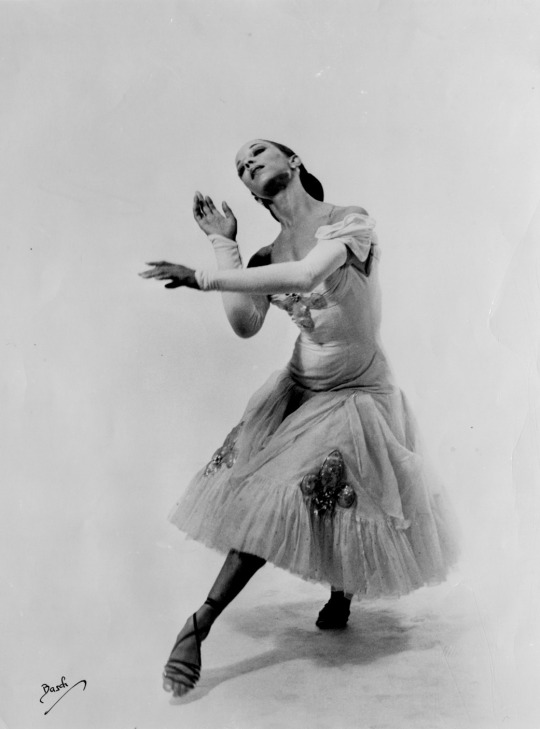
Today In History
Janet Collins broke color barriers in the 1950s when she became the first African American prima ballerina and one of the very few prominent black women in American classical ballet.
Collins was born in New Orleans, LA, on this date March 7, 1917, and today we are honored to share a glimpse into the life of a crucial figure in ballet history.
Ms. Collins made her debut as the leading dancer in the Met’s production of “Aïda.” She went on to become the first African American prima ballerina with the Metropolitan Opera. Ms. Collins was also a member of SAB’s guest faculty, teaching modern dance classes at the School from 1949-1950 and then again from 1967-1969.
“Everything was clear. But the speed with which Janet Collins moved was unbelievable,” said Arthur Mitchell an American dancer, choreographer, and director who was the first African American to become a principal dancer with a major ballet troupe, New York City Ballet. He later cofounded the Dance Theatre of Harlem.
“There was a wonderful feeling of flight all the time, but not flight to get away, flight to move. And she really reveled in the movement, she reveled in the movement. And as Balanchine said, ‘a dance is movement through time and space.’ She was the embodiment of that when she danced.”
CARTER™️ Magazine
#janet collins#carter magazine#historyandhiphop365#wherehistoryandhiphopmeet#history#cartermagazine#today in history#carter#staywoke#blackhistory#blackhistorymonth
76 notes
·
View notes
Text
The creators of She-Hulk legitimately don't know what they're doing

I think a lot of people have heard the director state
"There's a lot of talk about her body type and we based it on Olympian athletes and not bodybuilders."
Does anyone want to know a specific "Olympian" they based She-Hulk's body off of?
"Olympian Misty Copeland was a body that we referenced, you know, of someone who was very, very, very strong, but also could walk through the world and operate in the normal world at a scale that is very large, but it's still very human because she has to go on dates she has to work in a regular office."

Misty Copeland. Misty. Freaking. Copeland. She is a goddess and an icon. Here are some of her greatest accomplishments.
"2008 Leonore Annenberg Fellowship in the Arts and was named National Youth of the Year Ambassador for the Boys & Girls Clubs of America in 2013. In 2014, President Obama appointed Copeland to the President’s Council on Fitness, Sports and Nutrition. She is the recipient of a 2014 Dance Magazine Award and was named to the 2015 TIME 100 by TIME Magazine." - American Ballet Theatre
Misty Copeland is an amazingly talented person, who has dealt with immense struggles due to her body type, but she is not an Olympian. She's a ballerina. Ballet, by definition from Oxford Languages,
"...is characterized by light, graceful, fluid movements."
I'm especially pissed because when growing up, I was a ballerina. And my sister was a Track & Field thrower. When I heard of She-Hulk as a kid, I always imagined her looking like my sister. Looking like her build - not the ones of prima ballerinas.

While writing this, I've been sitting here thinking about how many great ACTUAL Olympians they could have used as inspiration for She-Hulk's build.

Raven Saunders aka The Hulk. 2020 Tokyo Olympics Silver Medalist in Shotput.

Hidilyn Diaz. 2020 Tokyo Olympics Gold Medalist and Record Holder in 55 KG Weightlifting.
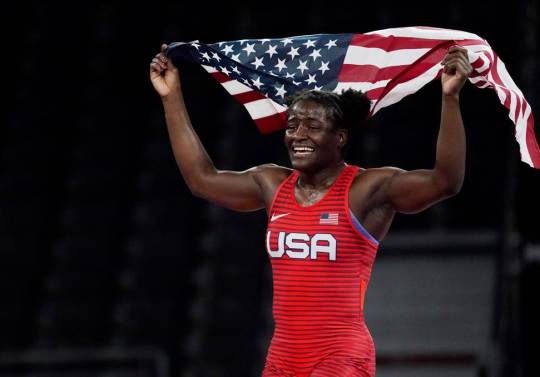
Tamyra Mensah-Stock. 2020 Tokyo Olympics Gold Medal in Freestyle Wrestling.
There are so many incredible female Olympians they could have used as inspiration. There are so many strength-based sports. The Summer Olympics alone have 33 sports.
But they specifically wanted She-Hulk's build to be inspired by
"not bodybuilders."
Even if this meant putting more work on the VFX Artists of the show who made her larger to begin with. Sean Ruecroft, a VFX Artist who worked on Infinity War and Moon Knight, took to Twitter to let people know the struggles Marvel put their team through.
"I was at a company that did VFX for this. Apparently, she was bigger early on, but the notes kept saying to ‘make her smaller.'"
They put more work on the artists, pushing them into the same inspiration that was used for Natasha Romanoff.

"...light, graceful, fluid movements."

The creators didn't want a Hulk. They wanted grace, sex appeal, and a tiny waist on an hourglass figure.
1K notes
·
View notes
Text

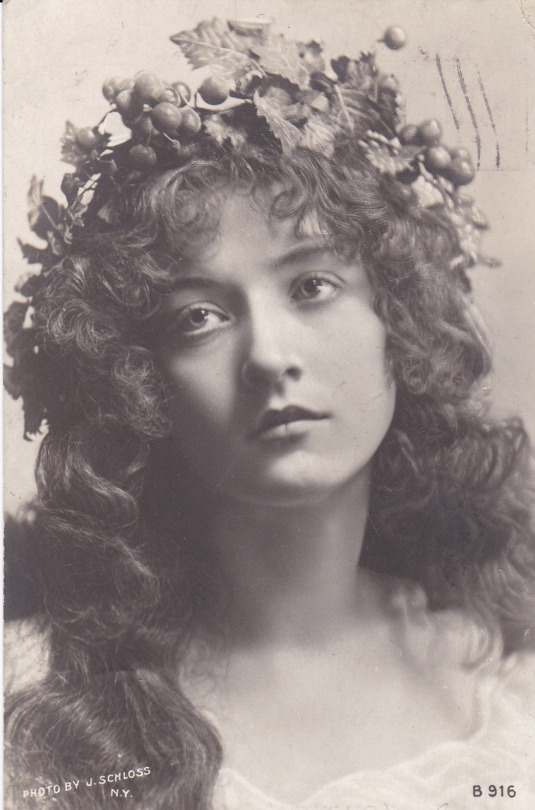
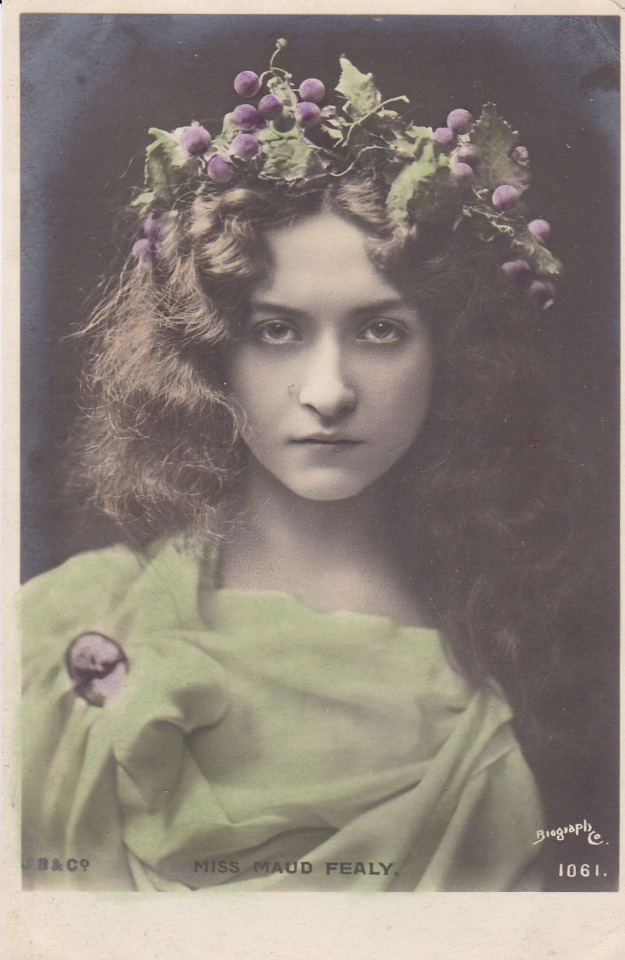
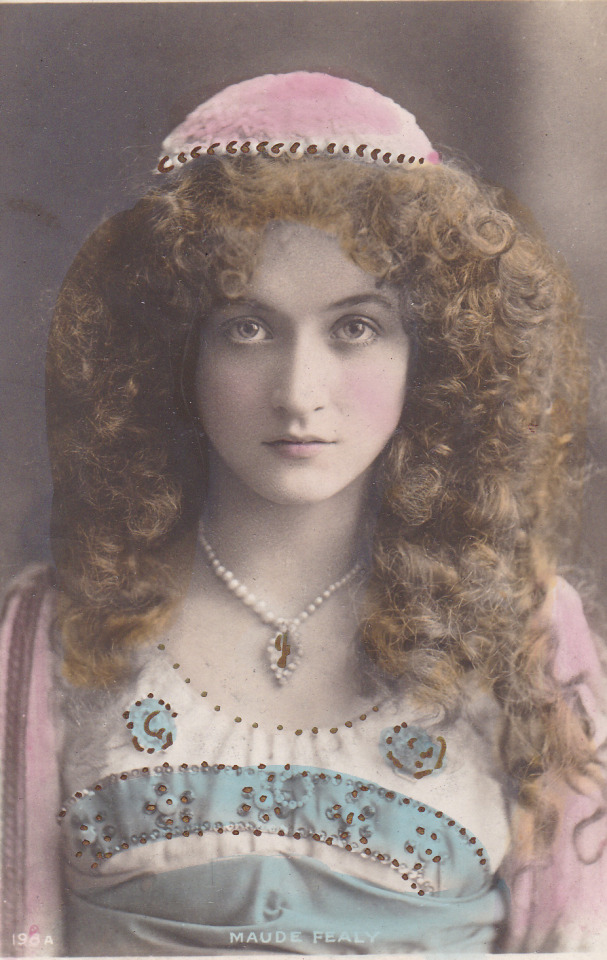



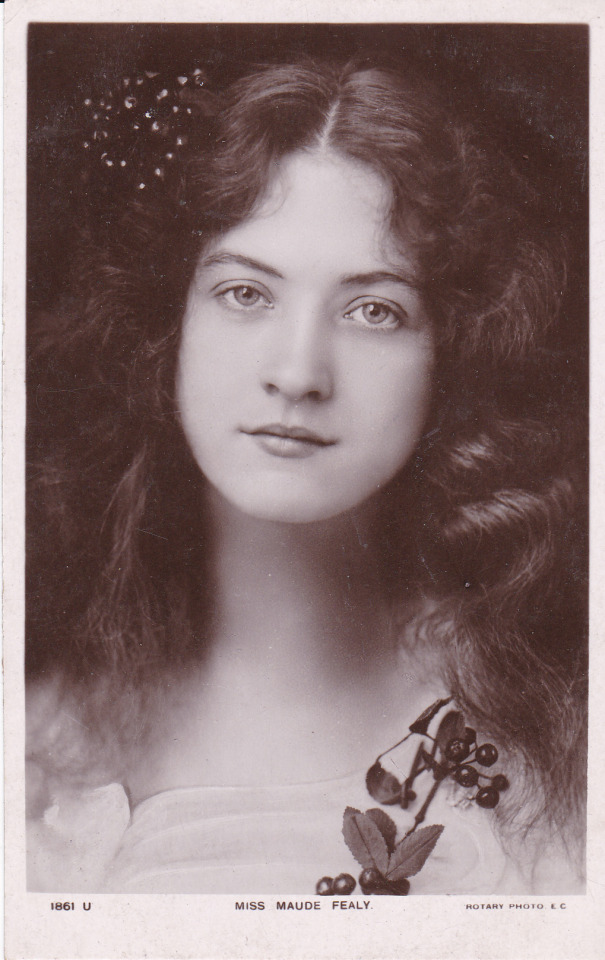
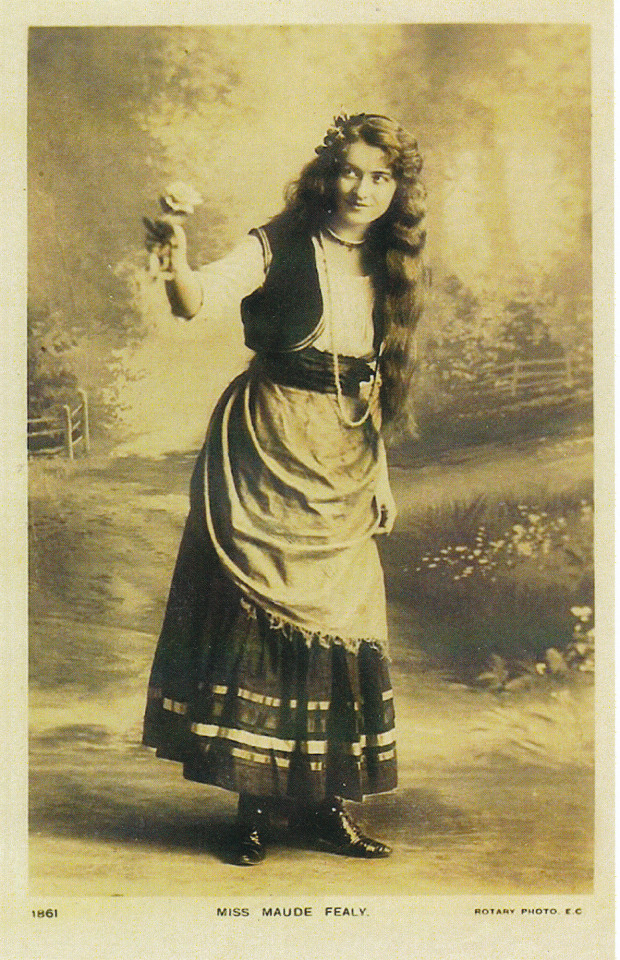
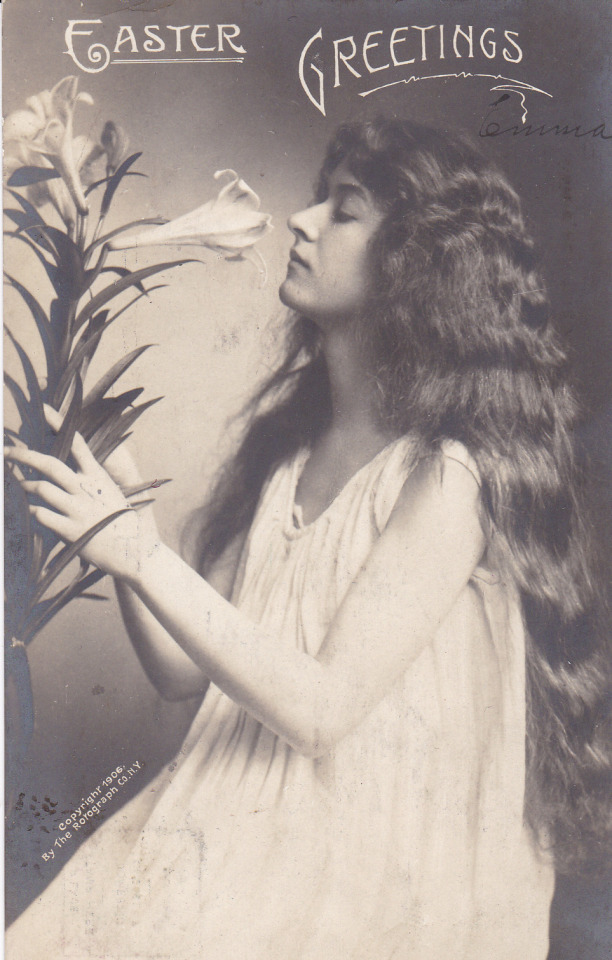


I posted the FAB silk postcard of the American actress, Maude Fealy a couple of weeks ago and said that I would post some more about her, here a are few more images of Maude from my collection of postcards and photographs.
The first postcard shows Maude as Alice Faulkner from the play 'Sherlock Holmes.' The third one shows Maude as Eunice from 'Quo Vadis'.
The sixth postcard shows a winning photograph by Burr McIntosh from the French magazine 'Paris Figaro Illustre.' Maude's photograph was sent to their competition (to find the most beautiful woman in the world) by the American photographer, William Burr McIntosh. Maude was the winner, chosen from out of 30, 000 entrants from all over the world.
Some information about Maude from Wikimedia.
Maude Mary Hawk was born on March 3/4, 1881-3 in Memphis, Tennessee (the dates vary depending upon the source) the daughter of actress Margaret Fealy and James Hawk, who divorced. Maude took her mother's name, Fealy.
In 1896, she made her debut at the Elitch Theatre in Denver playing various children's roles. Her first appearance was during the week of July 19 in Henry Churchill de Mille's The Lost Paradise. In 1905, Churchill de Mille's son Cecil B. DeMille was hired as a stock player at Elitch Theatre, and Maude appeared as the featured actress in several plays. Their friendship continued for decades, including when DeMille cast Maude in his film The Ten Commandments.
Maude made her Broadway debut in the 1900 production of Quo Vadis, again with her mother.
Maude toured England with William Gillette in Sherlock Holmes from 1901 to 1902. Between 1902 and 1905, she frequently toured with Sir Henry Irving's company in the United Kingdom, and by 1907, she was the star in touring productions in the United States.
In Denver, Colorado, Maude met a drama critic from a local newspaper named Louis Hugo Sherwin (son of opera singer Amy Sherwin). The two married in secret on July 15, 1907, because, as they expected, her domineering mother did not approve. The couple soon separated and divorced in Denver in 1909. Maude then married actor James Peter Durkin. He was a silent film director with Adolph Zukor's Famous Players Film Company. This marriage ended in divorce for non-support in 1917. Soon after this, Maude married John Edward Cort. This third marriage ended in a 1923 annulment and was her last marriage. She bore no children in any of the marriages.
Maude died on November 10, 1971.

190 notes
·
View notes
Text
Formed in 1913, Equity currently represents over 51,000 professional actors and stage managers. The Drunk Shakespeare Chicago union would not just represent the performers and crew, however, but the entire staff, including servers and bartenders. Union leaders were able to get 100 percent of the Chicago cast and crew to sign their authorization cards, which might not have happened if everyone’s concerns had not been addressed upfront, Fent added.
“It’s thrilling to be a labor leader at this moment in which arts workers across the country, like our colleagues in other industries, are claiming their power,” said Equity president Kate Shindle in a press release. “That’s exactly what the members of Drunk Shakespeare United are doing. These actors and stage managers, servers and bartenders have banded together to unionize in order to achieve a fairer, safer workplace, and Equity is eager to support their efforts. I hope that companies of other shows—who might not have realized that they too can have a unionized workplace—will be inspired by Drunk Shakespeare United’s decision to stand together and say, ‘We deserve better.’”
---
Krull explained that during the first weekend in April, the Drunk Shakespeare D.C. team suffered a company-wide COVID-19 outbreak, and half of the staff were out sick. Instead of canceling the shows, they said, upper management pushed the few remaining company members to do back-to-back sold-out shows that Friday. Both managers were out sick, so no management was there that night, and actors were tasked with operating both the light and sound boards despite having no training on either, since no stage manager was present.
“Actors would run onstage to say a line, run off to support stage-management tasks, and then run around to deliver or reset a prop before [returning onstage],” Krull described. “We were fortunate that there were no incidents with inebriated patrons on this particular night, but the staff on duty did not feel supported, and it was a catalyzing factor in our unionization.”
#shakespeare#william shakespeare#drunk shakespeare#equity#actors equity#union#unions#chicago#theater#theatre#actors#american theatre magazine#crew#bartenders#dc#dc theater
8 notes
·
View notes
Text
The Rise and Fall of ‘KPOP’

Why is this groundbreaking Broadway musical closing so soon? The tale of its creation, evolution, marketing, and critical reception offers plenty of clues—and some glimmers of hope.
BY MARCUS SCOTT
KPOP will play its final Broadway performance this Sunday, Dec. 11, after 44 previews and 17 performances (during previews, the show canceled multiple matinee performances and one of the leads got COVID, prompting producers to move its official opening night to Nov. 27, one week after its initial opening celebration). This makes this historic musical the shortest-running Broadway musical since Neil Bartram’s The Story of My Life shuttered after 19 performances in 2009.
Cancellations and delays have become commonplace as Broadway rebounds from a pandemic and a global quarantine that affected all live gatherings, but theatre in particular. The closure and slow return has had a major impact on Broadway, with 2021-22 revenue and attendance taking major hits, falling from the historic record of $1.829 billion set by the 2018-19 season to the total of $845.4 million last season. These statistics by the Broadway League indicate a plunge of 54 percent, marking a drop in audience attendance, which saw a record high of 14.7 million in 2019 but fell to 6.72 million this past year. Shows like the long-running Phantom of the Opera and A Strange Loop—an artistic triumph which won the Pulitzer Prize for Drama and earned the Tony Award for Best musical at this year’s ceremony—will end their respective runs on Broadway early next year. Even Stomp, the Off-Broadway percussion-and-movement mainstay, is set to end its 29-year run at the Orpheum Theatre next month.
One might surmise that KPOP, a pop musical penned and composed by three hip yet largely unknown theatre artists, was in part a casualty of some of these seismic forces. But the story isn’t that simple. Like many shows, it faced delays and cancellations due to COVID, but ticket sales were markedly anemic throughout the show’s preview period, leading many to point fingers at the show’s faulty marketing efforts to attract younger audiences and fans of the increasingly popular Korean music genre that gives the show its title.
And then there was the question of the show’s critical reception, which was decidedly mixed. Most reviews weren’t positive, with at least one major exception (Variety posted a rave), but it didn’t help that The New York Times’s Jesse Green had nothing nice to say about the show, comparing it unfavorably to KPOP’s 2017 Off-Broadway staging and writing that “those who aren’t hard-core fans of the genre or don’t understand Korean” would probably not enjoy the show (a bizarre appraisal, considering the show is performed primarily in English, with occasional Korean lyrics and dialogue, and with its Playbill making history as the first to be bilingual). Green also received criticism for referring to Jiyoun Chang’s million-dollar kilowatt lighting designs as “squint-inducing,” an unfortunate word choice that led many to perceive his review as racist, even if unwittingly so; producers and cast members went so far as to ask Green and the Times for an apology, though none was forthcoming.
Naturally, when news broke that the show would end its run just two weeks after its official opening, the theatre community went into an uproar about what went wrong with a show that so many—and not just those involved in its making— thought deserved a better chance to find an audience.
“Globally, this is a case of how the status quo of Broadway marketing (run by predominantly white people) fails to lift up projects attempting to bring new diverse audiences to Broadway,” wrote associate director Seonjae Kim via e-mail.
How did KPOP arrive at this crossroads? Just before Thanksgiving and the show’s postponed opening night, I spoke with members of the creative team. The behind-the-scenes story of this groundbreaking musical is a tale of intense collaboration, evolving perceptions and intentions, and a lot of creative tinkering. Just as KPOP deserved a longer run, this story ought to be told.
Blast Off
On a mid-November afternoon, when I finally got in touch with composer Helen Park, she was holed up in the lower lobby of the Circle in the Square Theatre between rehearsals, surrounded by a wall of placards and production photos taken at the venue over its celebrated 50-year history. Connecting over FaceTime, our initial hellos were a bit klutzy. It’s not every day you’re tasked with interviewing a friend, after all: Park and I both attended New York University’s Tisch School of the Arts, where we enrolled into the Graduate Musical Theatre Writing Program in 2011. There we spent two years finessing our craft, fidgeting with our skill sets, and finding our voices. Similar to my own experience, Park faced and fought the stereotypes and preconceptions of patronizing elders in the musical theatre field. She’s a global citizen woman of color who writes radio-friendly ditties with an effervescent pop sheen, in the face of a post-Sondheim white cis-het male-dominated industry; I’m a lower-middle-class Black poet and journalist-turned-librettist-songwriter who had more in common with the security guards manning the entrances than the trustafarian hipsters and preppies who frequented the campus.
Park handled it all like a boss, probably because she has a knack for proving others wrong. At the age of 5 in Busan, Korea, she began playing classical piano, learning Schubert, Chopin, and Rachmaninoff. At age 9, her father’s studies brought her to Missouri for two years, where she played state-level competitions. In sixth grade, she attended a musical theatre summer school in Virginia, cementing her love of the craft with a production of Mary Rodgers’s musical comedy Once Upon a Mattress. After attending middle school back in her native Korea, she convinced her parents to send her more than 7,000 miles away to a Christian conservative boarding school in Alberta, Canada, where she would spend her high school years listening to ’90s and early-2000s Korean pop ballads as a source of comfort and connection. After a stint studying life sciences, she moved to the Big Apple, where she befriended co-lyricist and co-composer Max Vernon.
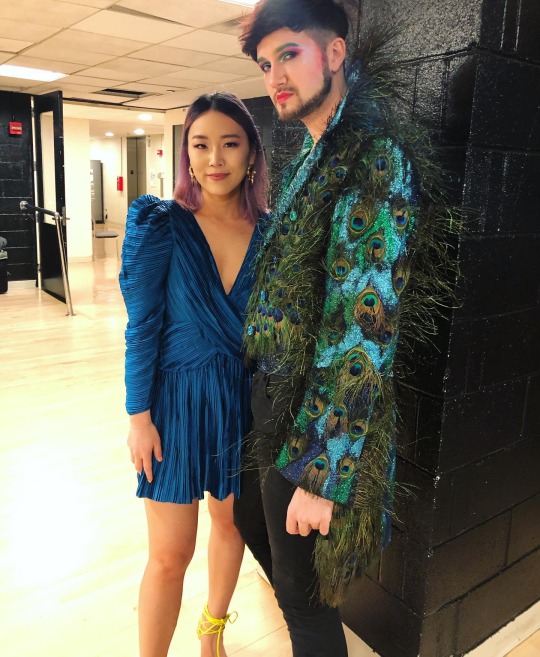
Vernon and Park’s collaborations began in graduate school, when a joint assignment led to The Lament of Asian Girl #3, a satirical romp about stereotypes and casual racism in the film and theatre industries. Park told me she really responded to Vernon’s lyrical style, describing it as edgy, fresh, and singular. In 2014, Park was approached by Vernon, who was already in talks with Ars Nova about developing a musical about K-pop; Vernon introduced her to director Teddy Bergman of Woodshed Collective, as well as co-conceiver and librettist Jason Kim. She then partook in a sort of bake-off developmental workshop, alongside AAPI storyteller A. Rey Pamatmat, playwright Jeremy Lloyd, and the songwriting team of Maggie-Kate Coleman and Erato A. Kremmyda.
“We were experimenting with having many different composers write this score,” said Park, who music-directed and contributed two songs to that initial workshop. “But we all felt there needed to be cohesiveness to the score, because they were all so different from each other. So Max and I became a team from there.”
Bergman described the origin of KPOP as an “arranged marriage” orchestrated by Ars Nova, with artistic director Jason Eagan and former associate artistic director Emily Shooltz bringing together a team to explore an immersive show set in the K-pop universe. Little did he know that Kim and Vernon, members of Ars Nova’s Uncharted program, had already been ruminating on the same subject. After a successful series of workshops in 2016, Ars Nova greenlit the musical for a limited engagement.
Meant 2 Be
For those who saw the 2017 production, including many critics, the new Broadway version of KPOP feels more like a reinvention than a reboot—a spiritual successor from an alternative timeline or fictional metaverse, if you will. Performed in the expansive A.R.T./New York Theatres space, the Off-Broadway production divided audience members into groups who were given a tour of JTM Entertainment, a fictional K-pop music factory owned by South Korean power couple Moon (played by James Saito) and his wife Ruby (Vanessa Kai), hoping to break into the North American market with their brand of infectious pop. Tapping the San Diego-born Korean American agent Jerry (James Seol), they strategized to tip the scales in their favor, plotting world domination with their contagious confection of earworms.
Theatregoers who toured the multilevel, multiroom facility were then introduced to the five-member boy band F8, the six-singer girl group Special K, and Seoul’s reigning glitterball prima donna, MwE (Ashley Park, in a star turn before her Tony-nominated performance as Gretchen Wieners in Mean Girls). They also met the company’s toxic in-house plastic surgeon Dr. Park (David Shih), ferociously vicious vocal coach Yazmeen (Amanda Morton), and ruthless dance instructor Jenn (Ebony Williams, last seen as a backup dancer on Beyonce’s Formation tour and best remembered for the “Single Ladies” music video).
Onlookers observed as the JTM artists were put through the wringer: Required to participate in mandatory rehearsals to flawlessly execute physically demanding vocal and dance exercises, they were also expected to workshop and generate new recorded material around the clock, to cultivate their fickle fandom via social media, to receive media training, and to confront their body dysmorphia via a rhinoplasty examination for any facial imperfections. And this summary barely scratches the surface of a show that also addressed themes of xenophobia, racism, and child labor.

Audiences, and most critics, relished the soap opera-esque storytelling, with larger-than-life Asian performers playing multi-dimensional protagonists rather than sidekicks or tertiary tropes. That iteration of KPOP would go on to become the most nominated show of the 2017-18 theatrical season, taking home the Lortel Award for Outstanding Musical, a Richard Rodgers Award, and an Off-Broadway Alliance Award for Unique Theatrical Experience, while earning multiple nominations for both the Drama Desk Awards and Drama League Awards.
Even before the show received these plaudits, a Broadway transfer seemed imminent, with lines trailing down city blocks and theatregoers cosplaying as characters from the show. Yet no one could predict the trajectory of pop culture, or of Broadway, within the demi-decade to come, and that’s where things get tricky.
Super Star
Five years later, there’s no denying that K-pop has found a home in the land of Stars and Stripes. Just ask the legions of superfans backing radio leviathans like Blackpink (the highest-charting K-pop girl group on the Billboard Hot 100 and Billboard 200), Seventeen (the first K-pop group to be nominated and win the MTV Push Performance of the Year), Girls’ Generation (recent Guinness World Records holders), SuperM (the first Asian artists to top the chart with a debut release) and BTS (the first act to have six consecutive No. 1 singles on the Hot 100 in the shortest amount of time since The Beatles), to name a few. While there has yet to be a singular crossover superstar equivalent to the likes of Lizzo, Billie Eilish, Anitta, Doja Cat, or Olivia Rodrigo, it is only a matter of time before K-Pop produces its own international superstar. Blackpink’s Lisa, who was recently honored at the 2022 Video Music Awards for Best K-Pop for her solo single “Lalisa,” could be a contender.
KPOP director Teddy Bergman recalled a sold-out BTS concert at MetLife Stadium in 2019, marveling at “the umbrella of who was in that crowd, not only AAPI audience members, but just a wildly diverse audience base there, singing along to songs in Korean.” Bergman, the son of first-generation German Jewish refugees, added, “Seeing that radical expansion brings up questions of, when the tent of your music gets so large, what piece are you holding onto? Like, is there a question of the dilution of the form as you’re spreading it further and further and you’re reaching a wider audience?”
Among other things, such rapid development in the cultural milieu meant that the writers would have to update their references. Vernon said that when the show was initially conceived, the creative team was influenced by an earlier generation of K-pop stars: Wonder Girls, Girls’ Generation, SHINee, 2NE1, Big Bang, Exo, Psy. By the time the show was headed to Broadway, the songwriting team had turned their ears to a new generation: BTS, Blackpink, NCT 127, Seventeen, New Jeans, Monsta X, and Vernon’s personal favorite, Lee Tae-min of Shinee and the supergroup SuperM. For her part, Park name-checked inspirations as wide-ranging as You Hee-yeol of the one-man band Toy, R&B music icon Stevie Wonder, global music megastar Michael Jackson, jazz, and ’90s sentimental pop ballads.

Changing perceptions of K-pop would also demand a different focus for the show: The burning question for the KPOP characters this time around wouldn’t be whether these acts would go mainstream, but rather what they would be forced to sacrifice in that crossover: their identity, as they assimilate into the global market, or their autonomy and individuality as they reach the upper echelons of fame?
The other big challenges of the Broadway transfer were scale and form: Not only were none of the 41 Broadway theatres equipped to present an immersive experience of the kind the previous KPOP had, but, as book writer Jason Kim wrote in an email, the original script “was over 500 pages. We had to include so much content to fill every corner of every room in the building. Cutting out parts of the story happened by necessity, but we also embraced it as an opportunity to distill the story down to its most essential points.”
The result that’s currently at Broadway’s intimate Circle in the Square features an 18-member cast and four swings, including real-life K-pop idols Kevin Woo (of boy band U-KISS), Min-Young Lee (of girl group Miss A), and Bohyung Kim (of girl group Spica and music duo Keembo), not to mention Korean multimedia singer-star Luna. Audiences are on hand to observe rehearsals for a one-night-only concert affair to be presented by a K-pop corporation called RBY Entertainment, which is looking to introduce their roster to America. K-pop impresario and momager Ruby (an attention-grabbing Jully Lee) is hedging her bets with three of them: the newly formed RTMIS (pronounced Artemis), the riveting F8 (pronounced fate), and her muse and prima donna of the dancefloor MwE (pronounced mu-wee), an orphan Ruby has personally raised for fame. The show’s form now resembles a combination of early-aughts VH1-style Behind the Music docudrama and memory play, telling the story of MwE’s road to superstardom through flashbacks and snapshots of her life, from her initial audition as a wide-eyed tween with big dreams and impressive pipes through the elaborate, Vox Lux-esque stage performances of her first world tour.
The new version of KPOP is in fact mostly focused on MwE and her struggles for independence, artistic freedom, individuality, work-life balance, and childhood trauma. While stage time in the 2017 production was evenly distributed, the stories of the other bands have been significantly if necessarily streamlined: Special K has been whittled down to the five-member RTMIS, though F8 has expanded from five to eight members. (And gone is MwE’s supposed younger shadow self, waiting in the wings to dethrone her.) Instead the new script introduces Juny, MwE’s guitar-plucking, golden-voiced boyfriend, who is intent on rescuing her from her gilded cage (played by a delightful Jinwoo Jung, seen in KPOP Off-Broadway as F8 member Oracle). Recording the spectacle is fame-hungry documentary filmmaker Harry (played by Aubie Merrylees, in a thankless part), who wants to turn the concert and its behind-the-scenes drama into a vehicle that will land him recognition and awards on the festival circuit.
On paper, this all sounds fine. But when one makes comparisons to that edgy original Off-Broadway production, the trials and tribulations faced by the RBY artists in the Broadway production come across as champagne problems. In the original production, the F8 segment focused on the cultural divide between South Korea and the U.S.; the Special K segment focused on the intersection of racism and sexism with regard to the unrealistic expectations of perfection; and the MwE segment interrogated the commodification of child stars. On Broadway, only the latter concern is truly explored in depth, while the challenges facing F8 are merely glimpsed and the RTMIS story is virtually non-existent.
There’s also the difference between Jerry and Harry. In the 2017 script, Jerry was a Korean American who had bought into respectability politics and the model minority myth, and was enforcing assimilation and cultural agility on the talent under his care. Jerry wasn’t a simple villain, as at the climax he realized his error and faced his internalized racism. But in the new script, Harry is little more than a stand-in for the exploitative, imperalist white gaze, demanding that the biracial, people-pleasing Brad (Zachary Noah Piser) translate what the other boy band members are saying in Korean in return for a stronger spotlight in the documentary.
Songwriter Vernon explained these choices in part as a result of the sea change in K-pop’s popularity.
“When we started writing almost nine years ago, it was about whether or not K-pop could transfer and cross over to an American pop market, and we were asking ourselves questions of what would the sacrifices those artists would have to make in terms of their own personal and cultural identity to appeal to American audiences,” Vernon told me during a break from rehearsal for their show The Tattooed Lady, which ran just before KPOP‘s opening at the Philadelphia Theatre Company. “I think one of our main assumptions was that there would have to be a much greater cultural sacrifice, so we had this character of Jerry, this American consultant who was encouraging the K-pop artist to do things that were in many ways harmful to who they were, hiding who they were in order to appeal to America. At the end of the show, the realization was that actually the best way to appeal to America is just that the K-pop artists be fully themselves; they don’t need to cross over to us, we need to cross over to them. In 2017, that was a really powerful message, but since we did the show, K-pop has crossed over.”
Added Park, “Through the pandemic, there was this reckoning. Asian Americans and people of color started grappling with their own identity; it was so important to us to honor as much authenticity as we can for K-pop and Korean pop culture, so our focus kind of shifted, which meant the story had to change. Instead of asking, why hasn’t K-pop crossed over into the U.S., we started to go into what is the experience of being a K-pop star? What is the joy and exhilaration, but also the sacrifice?”

Still, without the animating drama of crossover, audiences for the new KPOP—both K-pop diehards and the uninitiated—may be confused about what they are supposed to take away from the show. Here’s where the critiques of Jesse Green and others, however pointed or problematic, aren’t totally unfounded. By making such changes, one could argue that the KPOP team turned one of the most singular, innovative, and genre-bending triptych theatrical productions of the last 25 years into one of the most traditional, bare-bones, and sanitized productions of the post-pandemic era. Instead of showing the rot beneath the sparkling ruby, this version of KPOP only covers it up with more precious gems; the sharp, subversive edges of the original were dulled and smoothed down or completely obscured, and the darker extremities explored in 2017 trimmed away.
I think the creative team made the incorrect assumption that because K-pop has exploded in the U.S., Americans are likewise familiar with South Korean customs and culture, which couldn’t be further from the truth. You would never guess from KPOP that South Korea has one of the highest suicide rates among OECD member nations, with a 2016 study finding that 30 percent of South Koreans suffer from mental illness, though only half seek treatment. Or that in the last five years, there have been a string of notable suicides in the Seoul music industry, including songwriter-producer Kim Jonghyun of Shinee, barrier-breaking industry rebel Sulli of f(x), and actress-singer Goo Hara of Kara. Imagine the power of a script in which the animosity between F8 members and hapa newcomer Brad arose in part because the band member he replaced had committed an act of self-harm instead of simply being mysteriously fired. Or, given K-pop’s trend of queer-baiting, its litany of “skinship” performances from acts like NU’EST, VIXX and OnlyOneOf, having an openly queer member of F8 would have certainly added nuance. Imagine what that could have done for songs like “Han Guk Nom (Korean Man)” and conversations around Asian masculinity in South Korea’s often conservative Christian society. (John Yi’s commanding, laugh-out-loud performance as F8’s smoldering Danny, for example, would be an obvious choice for this storyline.) This would not only have honored the queer artists who have penned some of the genre’s biggest hits, but the LGBTQIA+ artists who penned KPOP itself.

All of this is not to say that the new KPOP didn’t make improvements. Park Sun-young, known internationally as Luna, gives a nuanced performed as MwE, and the fact that Luna’s own career trajectory bears striking similarities to MwE’s adds a layer of meta-authenticity that wasn’t a part of the 2017 Off-Broadway run. Following a 2006 appearance on the Seoul Broadcasting System reality TV show Truth Game, Luna was scouted by the powerhouse label SM Entertainment prior to making her debut as the main vocalist and lead dancer of South Korean hipster girl group f(x), alongside Victoria, Amber, Krystal, and Sulli in 2009. The quintet earned critical and commercial success domestically and internationally, becoming the first K-pop act to perform at SXSW. And with her role in KPOP, Luna is the first K-pop idol to have a leading role on Broadway.
That’s not the only historic first marked by KPOP: It’s also the first Korean-centric musical with Korean, Korean American, and AAPI representation (on- and offstage) to grace the Great White Way, and only the third Broadway musical to highlight Asian American heritage with Asian Americans in both the cast and the creative team. Helen Park makes history as the first Asian American woman composer of a Broadway musical, and only the sixth Asian composer ever. And Luna isn’t the only one making her Broadway debut; so is almost the entire cast (Zachary Noah Piser, Eddy Lee, Major Curda, and Aubie Merrylees are the exceptions). That places a lot of undue pressure on a show like this, leaving little room for error—ironic for a show about artists striving for perfection.
Phoenix
So why is the show closing? A sentiment shared among industry observers and theatregoers is that the marketing team backing KPOP just didn’t make enough of an effort to target contemporary enthusiasts of the K-pop genre. The producers seem to have hoped those fans would be attracted by the K-pop recording stars in the cast, but there’s a fallacy in this logic: The idol industry cycles through performers cursorily, so that there’s not enough collective memory for that to translate to tickets sales or merchandise (another theme and plot point in the original Off-Broadway production that is all but absent this time around).
“There are a myriad of complicated reasons why KPOP is closing its doors prematurely,” wrote associate director Seonjae Kim in an email. “But in my opinion, a big one is the marketing and outreach. Our social media endeavors were essentially non-existent until it was way too late in the game to build buzz. Many posts were low-effort and failed to utilize even the most basic of algorithm principles (like using hashtags). There are many accounts of cast and team members reaching out with impressive personal connections and promotional opportunities that went unanswered. In my opinion, there was zero strategy and innovation on how to market this incredibly non-traditional show to non-traditional audiences.
She continued, “Amidst the sadness, it’s been a real pleasure to see to see that our houses do not look like a typical Broadway-going audience: so many young folks, AAPI folks, folks carrying signs for their favorite K-pop star in the show. From their enthusiasm, and the fervent energy of the social media campaign once we announced our closing, I have really come to believe we missed our opportunity to tap into the immense spending power of so many who were hungry to see something so different on Broadway. We could have and should have reached so many more of them. I hope that future shows can learn from what happened to us. I hope that how theatre is funded, marketed, and sold can catch up with the innovations of the stories being told.”
A day before the news of the closing broke, producers announced that Sony Masterworks Broadway will release a cast album of the show on Feb. 24, 2023, with record producer Harvey Mason Jr. (one half of the production duo The Underdogs), a veteran hitmaker who has been very prominent in the K-pop scene, at the helm alongside music director Sujin Kim-Ramsey. The show’s blend of power ballads, reggaetón, glow-in-the-dark EDM, nu-disco, progressive house, techno, hip-hop, trap, and Korean wave dance-pop should make it the most anticipated cast album of the season. It will undoubtedly introduce the show to many more folks who could see it during its short run. And who knows? It could even give KPOP a chance at a second life or a future remount, given its massive appeal to young audiences and K-pop fans. If that does happen, future producers will hopefully have learned that the show needs something more than the usual marketing approach and word-of-mouth.
For now, its creators are celebrating the moment while it lasts.
“There is something still inherently radical about this cast, these bodies, inhabiting this story, on this stage, especially out of an unbelievably difficult set of years for everyone and for everyone in very different ways,” said director Teddy Bergman from his Brooklyn apartment as he prepared for an emergency rehearsal. “There’s a tremendous amount of joy on that stage, and I think experiences of collective joy and stories of redemption and hard-won strength and release are necessary public rituals at this moment in time.”
In a new essay for Playbill, Helen Park shares a story about her own young son that demonstrates one way the show is a hit, no matter its box-office numbers.
“He told me he wanted to be in KPOP when he grows up, ‘if it still exists,’” she writes. “He might be too young to realize the significance and the rarity of this, but he saw himself represented onstage, loud and proud, flawed and complicated. He saw himself represented as fully human, on the Great White Way. That’s the moment I felt like I must have done something right.
“I see audiences like my son every night, young and old. I see how their eyes light up as they see themselves represented in the form of superstars. Perhaps for some of them, they’re superheroes.”
Marcus Scott is a New York-based playwright, musical writer, and journalist. He’s written for Architectural Digest, Time Out New York, The Brooklyn Rail, Elle, Essence, Out, and Playbill, among other publications.
The article originally misstated the timing and source of quotes from Seonjae Kim. It failed to mention that a lead getting COVID was a factor in the postponement of opening night, and it also stated incorrectly that the entire cast is making their Broadway debut.
#Marcus Scott#MarcusScott#American Theatre Magazine#KPOP#KPOP musical#Broadway#Off Broadway#Max Vernon#Helen Park#Jason Kim#Teddy Bergman#Seonjae Kim#LUNA#fx#Kevin Woo#ukiss#kpop broadway
0 notes
Photo


Lorraine Hansberry, May 19, 1930 / 2023
(images: 'A Raisin in the Sun' by Lorraine Hansberry, «Playbill», Volume 120, No. 6, June 2004. Collection of the Smithsonian National Museum of African American History and Culture, Smithsonian Institution, Washington, D.C.)
#graphic design#theatre#theater#play#magazine#cover#magazine cover#lorraine hansberry#birthday anniversary#playbill#national museum of african american history and culture#smithsonian institution#1930s#2000s#2020s
30 notes
·
View notes
Text
palestinian poets: george abraham
george abraham (they/he/هو) is a palestinian american poet, performance arist, and writer who was born and raised on unceded timucuan lands (jacksonville, FL). their debut poetry collection birthright (button poetry) won the arab american book award and the big other book award, and was a lambda literary award finalist. he is also the author of the chapbooks al youm and the specimen's apology. their collaborations include co-editing a palestinian poetry anthology with noor hindi (haymarket books, 2025), and a performance art project titled EVE with fargo nissim tbakhi.
they are a recipient of fellowships from kundiman, the arab american national museum, the boston foundation, the national performance network, and the MAP fund, and more. their writing has appeared in poetry magazine, the nation, the american poetry review, guernica, the baffler, the paris review, mizna, and many other journals and anthologies. a graduate of swarthmore college and harvard university, they have taught at emerson college, and are currently a litowitz MFA+MA candidate in poetry at northwestern university. he is also currently executive editor of the whiting award-winning journal mizna.
you can follow them on twitter @IntifadaBatata.
IF YOU READ JUST ONE POEM BY GEORGE ABRAHAM, MAKE IT THIS ONE
OTHER POEMS ONLINE THAT I LOVE BY GEORGE ABRAHAM
Field Notes on Terror & Beginnings at poetry daily
Love Letter to the Eve of the End of the World at the margins
Of Nation, at rusted radishes: beirut literary and art journal
Searching for a Palestinian After at the nation
Stage Directions for a Representation in which Eve and Adam travel through their first checkpoint at mosaic theatre company
the ghosts of the dead sea are rising at the drift
ars poetica in which every pronoun is FREE PALESTINE at the margins
“from UNIVERSAL THEORY IN WHICH EVERY FAILED ATTEMPT AT LOVE IS A SOULMATE FROM AN ALTERNATE TIMELINE” at fiyah literary magazine
Ode to My Swollen, Mono-Infected Spleen at brooklyn poets
The Olive Tree Speaks of Deforestation to my body at crabfat magazine
arab/queer vs. Imaginary at shade literary arts
self-portrait with second-degree sunburn at
[ summer / winter ] is the worst time to lose a [ country / lover ] at wildness
maqam of moonlight, for the wandering at the rumpus
against perturbation at the scores
apology, at cordite poetry review
i also adore this 2021 essay of abraham's at guernica magazine called teaching poetry in the palestinian apocalypse: towards a collective, lyric "i".
49 notes
·
View notes
Text
Never mind the 22nd amendment. Some Trumpsters are already talking about a THIRD Trump term.
The American Conservative magazine published an article last week in which the author, Peter Tonguette, argued that Trump should be able to run for a third term in office in 2028. This drew some attention in non-Trump circles as a potential trial balloon by Project 2025, the authoritarian policy agenda that is guiding Trumpworld right now.
Tonguette argued that Trump’s victory in the GOP primary contest this year shows that voters still support him—and that they should be allowed to do so indefinitely. “As the primary season has shown us, the Republicans have not moved on from Trump—yet the Twenty-second Amendment works to constrain their enthusiasm by prohibiting them from rewarding Trump with re-election four years from now,” he wrote, perhaps getting ahead of himself a bit.
I do not doubt that Trump would run for a third term if he could. He has addressed the possibility before, suggesting in 2020 that he should get to run for one “because they spied on my campaign,” referring to his political opponents. And at a closed-door fundraiser in 2018, Trump also favorably referred to Chinese President Xi Jinping for eliminating the two-term limit in that country. “He’s now president for life, president for life, and he’s great,” he reportedly told his supporters. “And look, he was able to do that. I think it’s great. Maybe we’ll have to give that a shot someday.”
Maybe Trump's campaign slogan for 2028 should be: Make America Belarus. The dictator of Belarus, a Putin satellite, has been using rigged elections to remain in power since 1994.
Never mind the US Constitution. Trump's trained seals on the US Supreme Court will gladly find some loophole allowing him to be president in perpetuity.
If somebody says he wants to be a dictator, believe him – especially if he's already a big fanboy of despots like Vladimir Putin, Kim Jong-un, and Xi Jinping.
It's almost always easier to prevent a dictator from taking power than it is to get rid of one who is already in power.
#donald trump#republicans#us constitution#dictatorship#the 22nd amendment#dictator on day one#trump's third term#project 2024#peter tonguette#democrats = democracy republicans = dictatorship#election 2024#vote blue no matter who
20 notes
·
View notes
Text
Fredi Washington
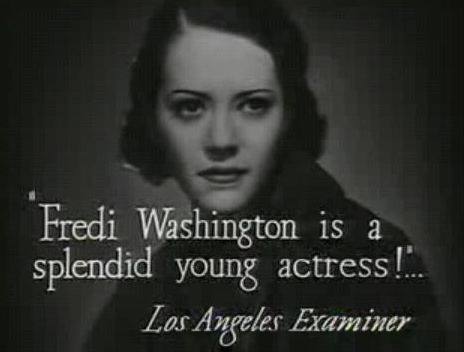
Fredericka Carolyn "Fredi" Washington (December 23, 1903 – June 28, 1994) was an American stage and film actress, civil rights activist, performer, and writer. Washington was of African American descent. She was one of the first Black Americans to gain recognition for film and stage work in the 1920s and 1930s. Washington was active in the Harlem Renaissance, her best known role being Peola in the 1934 film version of Imitation of Life, where she plays a young light-skinned Black woman who decides to pass as white. Her last film role was in One Mile from Heaven (1937), after which she left Hollywood and returned to New York to work in theatre and civil rights activism.
Fredi Washington was born in 1903 in Savannah, Georgia, to Robert T. Washington, a postal worker, and Harriet "Hattie" Walker Ward, a dancer. Both were of African American and European ancestry. Washington was the second of their five children. Her mother died when Fredi was 11 years old. As the oldest girl in her family, she helped raise her younger siblings, Isabel, Rosebud, and Robert, with the help of their grandmother. After their mother's death, Fredi and her sister Isabel were sent to the St. Elizabeth's Convent School for Colored Girls in Cornwells Heights, near Philadelphia, Pennsylvania.
While still in school in Philadelphia, Washington's family moved north to Harlem, New York. Washington graduated from Julia Richman High School in New York City.
Washington's entertainment career began in 1921 as a chorus girl in the Broadway musical Shuffle Along. She was hired by dancer Josephine Baker as a member of the "Happy Honeysuckles," a cabaret group. Baker became a friend and mentor to her. Washington's collaboration with Baker led to her being discovered by producer Lee Shubert. In 1926, she was recommended for a co-starring role on the Broadway stage with Paul Robeson in the play Black Boy. She quickly became a popular, featured dancer, and toured internationally with her dancing partner, Al Moiret.
Washington turned to acting in the late 1920s. Her first movie role was in Black and Tan (1929), in which she played a Cotton Club dancer who was dying. She acted in a small role in The Emperor Jones (1933) starring Robeson. In 1933, Washington married Lawrence Brown, the trombonist in Duke Ellington's jazz orchestra. That marriage ended in divorce. Washington also played Cab Calloway's love interest in the musical short Cab Calloway's Hi-De-Ho (1934).
Her best-known role was in the 1934 movie Imitation of Life. Washington played a young light-skinned Black woman who chose to pass as white to seek more opportunities in a society restricted by legal and social racial segregation. As Washington had visible European ancestry, the role was considered perfect for her, but it led to her being typecast by filmmakers. Moviegoers sometimes assumed from Washington's appearance—her blue-gray eyes, pale complexion, and light brown hair—that she might have passed in real life. In 1934, she said the role did not reflect her off-screen life, but "If I made Peola seem real enough to merit such statements, I consider such statements compliments and makes me feel I've done my job fairly well." She told reporters in 1949 that she identified as Black "...because I'm honest, firstly, and secondly, you don't have to be white to be good. I've spent most of my life trying to prove to those who think otherwise ... I am a Negro and I am proud of it."[7] Imitation of Life was nominated for an Academy Award for Best Picture, but it did not win. Years later, in 2007, Time magazine ranked it as among "The 25 Most Important Films on Race."
Washington's experiences in the film industry and theater led her to become a civil rights activist. In an effort to help other Black actors and actresses find more opportunities, in 1937 Washington co-founded the Negro Actors Guild of America, with Noble Sissle, W. C. Handy, Paul Robeson, and Ethel Waters. The organization's mission included speaking out against stereotyping and advocating for a wider range of roles. Washington served as the organization's first executive secretary. She was also heavily involved with the National Association for the Advancement of Colored People, widely known as the NAACP. While working with the NAACP, Fredi fought for more representation and better treatment of Black actors in Hollywood because she was one of the few Black actors in Hollywood who had some influence with white studio executives. Aside from working with those organizations to fight for the rights of Black actors, Washington also advocated for the federal protection of Black Americans and was a lobbyist for the Dyer Anti-Lynching Bill, which the NAACP supported.
Despite receiving critical acclaim, she was unable to find much work in the Hollywood of the 1930s and 1940s; Black actresses were expected to have dark skin, and were usually typecast as maids. Directors were concerned about casting a light-skinned Black actress in a romantic role with a white leading man; the film production code prohibited suggestions of miscegenation. Hollywood directors did not offer her any romantic roles. As one modern critic explained, Fredi Washington was "...too beautiful and not dark enough to play maids, but rather too light to act in all-Black movies..."
Washington was a theater writer, and the entertainment editor for The People's Voice (1942–1948), a newspaper for African Americans founded by Adam Clayton Powell Jr., a Baptist minister and politician in New York City who was married to her sister Isabel Washington Powell. She was outspoken about racism faced by African Americans and worked closely with Walter White, then president of the NAACP, to address pressing issues facing Black people in America.
In 1952, Washington married a Stamford dentist, Hugh Anthony Bell, and moved to Greenwich, Connecticut.
Fredi Washington Bell died, aged 90, on June 28, 1994. She died from pneumonia following a series of strokes at St. Joseph Medical Center in Stamford, Connecticut.
23 notes
·
View notes
Text
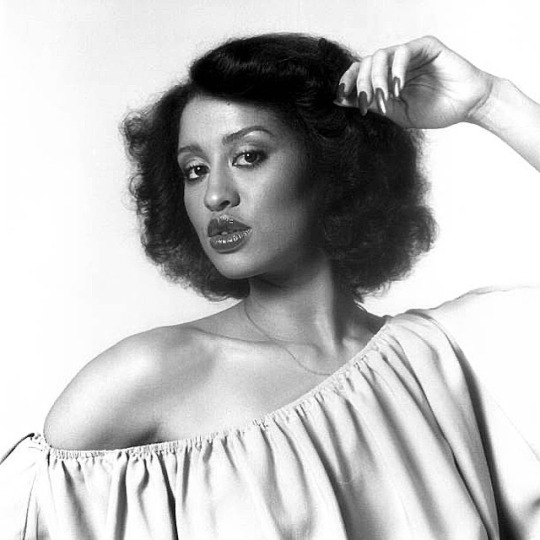
Today We Honor Phyllis Hyman
Phyllis Linda Hyman was an American singer-songwriter and actress, born in Philadelphia, Pennsylvania July 6, 1949. She was best known for her singles from the late 1970s through the early 1990s including: You Know How to Love Me, Living All Alone, and Don’t Wanna Change the World.
She performed on a national tour with the group, New Direction. Later she joined All the People while working with another group, The Hondo Beat. She made her acting debut in 1974 in the film Lenny. Hyman also led a group called Phyllis Hyman and the P/H Factor.
Hyman’s debut solo album named Phyllis Hyman was released in 1977 on Buddah Records. When Arista Records bought Buddah Records, she transferred to the new label and released four albums: Somewhere in My Lifetime (1979), You Know How to Love Me (1979), Can’t We Fall in Love Again? (1981), and Goddess of Love (1983).
She also performed on Broadway in the musical, Sophisticated Ladies, the tribute play for Duke Ellington. For that work, she received a Tony Award, nominated for Best Supporting Actress in a Musical, and won a Theatre World Award for Best Newcomer.
In 1983 Hyman recorded the song “Never Say Never Again” for the James Bond movie of the same name which starred Sean Connery but the song she recorded couldn’t be used for the movie soundtrack due to legal reasons. In 1986 Hyman released the album, Living All Alone, on the Philadelphia International label. She also appeared in the movies, Too Scared to Scream (1985), Spike Lee’s School Daze (1988), and The Kill Reflex (1989).
In 1991 Phyllis Hyman released the album, The Prime of My Life, on Philadelphia International, which was the biggest album of her career. It included her first number-one R&B hit as well her first Billboard Top 100 hit, Don’t Wanna Change the World. The album, her last released while she was alive, was certified gold by 1992.
Phyllis Hyman… One of the Greatest Artists of our Lifetime.
CARTER™️ Magazine carter-mag.com #wherehistoryandhiphopmeet #historyandhiphop365 #cartermagazine #carter #phyllishyman #music #blackhistorymonth #blackhistory #history #spikelee #schooldaze #staywoke
#carter magazine#carter#historyandhiphop365#wherehistoryandhiphopmeet#history#cartermagazine#today in history#staywoke#blackhistory#blackhistorymonth
132 notes
·
View notes